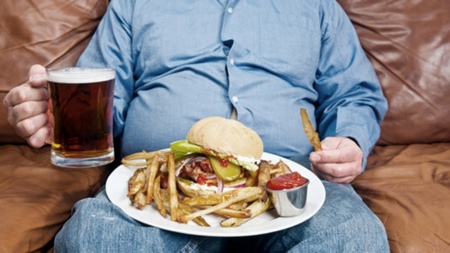Continuously eating small amounts of sweets, carbohydrates and fat, and getting up at midnight to rummage through the fridge are some of the acts that specialists constitute the “emotional hunger”, a concept that characterizes the behavior of people who resort to food as an escape route in a situation of emotional stress.
The idea refers to “when we eat for emotions”, as defined by Analía Yamaguchi, a clinical physician and nutrition specialist at the Italian Hospital of Buenos Aires.for whom there is a “real hunger” and one “emotional”.
“The first -he added- is a physiological process that appears slowly and, after eating, disappears. The second, on the other hand, appears abruptly and, in general, is selective towards foods rich in sugar, carbohydrates and fats. It’s a mental and emotional process.”
For his part, Laura Oliva, specialist in clinical nutrition and expert in metabolic diseases, commented to Télam that “it was from the publication in 2021 of a study on the ‘Phenotyping of obesity’ carried out by the Ecuadorian gastroenterologist Andrés Acosta, from the Mayo Clinic, that the concept ’emotional hunger’ acquired an objectifiable entity”.
“If appetite was previously alluded to and was associated with certain triggers or ‘triggers’, such as happiness or sadness, it is from this classification of obesity that people began to talk about eating behaviors. These are: hyperphagic behavior, when we cannot stop eating; hedonic behavior, related to pleasure; and emotional hunger, associated with stress and emotions”Olive argued.
In the opinion of Ignacio Porras, a graduate in Nutrition and president of the Fundación Sanar“what we call ’emotional hunger’ is the symptom of those people who channel stress through food.”
cheers observed that “people not only eat when we are hungry; sometimes we do it without having an appetite or, on occasions, we deprive ourselves of eating despite having it. This leads to the generation of eating behavior disorders.”
“We are permanently related to food by being immersed in a food system that promotes different consumptions that create their own eating pattern in each person, either due to previous experiences, access to food or not, identification culture, and due to environmental issues that can trigger anxiety situations in some people,” reflected Porras.
Liliana Albarenga consulted her nutritionist when she noticed that it was becoming recurrent, simultaneously with work problems that caused her stressgetting up at dawn to eat, said, “what you find in the fridge”; a habit that affects more and more people and that specialists call “emotional hunger” and that can lead to nutritional disorders if not treated in time.
Some of what Porras mentioned was looking for Albarenga (47 years old), who He should have consulted his nutritionist after noticing that work tensions made him get up at dawn to eat “whatever he found in the fridge.”
“Due to the pressures of my work – he told this agency – the stress activated in me a compulsion to eat during the night, which I had never had before. It took me a long time to whiten it and assimilate it because my eating behavior during the day continues to be normal, I even exercise, but during the night I binge and eat a lot, especially sweets”.
Indeed, according to the psychiatrist and therapist Juana Poulisis“When we seek to calm our anxiety through certain foods, they work as a regulator, which dampens and anesthetizes feelings of anguish and emptiness, but in the short term.”
“No one really eats a salad in a stressful situation,” Porras insisted.
Luna Segovia, 19 years old and who had suffered from anorexia when she was 15, during the pandemic she began to eat compulsively and gained a lot of weight.

“In therapy I worked on what could have triggered my sudden desire to eat,” he told Télam. And he added: “I think several things were added, I was about to finish high school, and with my family we were moving to another country, so I had to prepare to take exams abroad. I think all this, added to the situation health care since I was isolated from my friends made me anxious.
Poulisis warned that “if the behavior of compulsive, emotional eating, with binge eating and snacking is repeated and maintained over time, it will generate more anguish, more guilt, difficulties with weight, depression and isolation.”
Generally, Emotional hunger doesn’t appear out of nowhere or just because. Some specialists maintain that there is a biological predisposition related to the structure of the brain in certain people. Others, on the other hand, postulate the intervention of multiple factors such as the social environment, the environment, cultural identifications, rewards and punishments.
“In many cases it arises as a consequence of having gone through one of the ‘restrictive diets’ that impose as fashion ‘skipping meals’, or ‘intermittent fasting’; eating less or consuming ‘dietary’ products. In response to these prohibitions, they binge eating as the opposite effect, generating excessive behavior,” Poulisis analyzed.
For the specialist, “binge eating, which is the psychological term with which we name this type of diagnosis, can also appear in people who have psychiatric disorders, mood disorders, depression, post-traumatic stress or unresolved situations, such as abuse, for example”.
“When in the office, nutritionists, we analyze the eating behavior of our patients, we explore the ‘triggers’ that unleash these disordered behaviors and, many times, we refer them to psychotherapy, understanding that only from coping with a particular emotional situation , it will be possible to help regulate such eating behavior,” said Oliva.


















